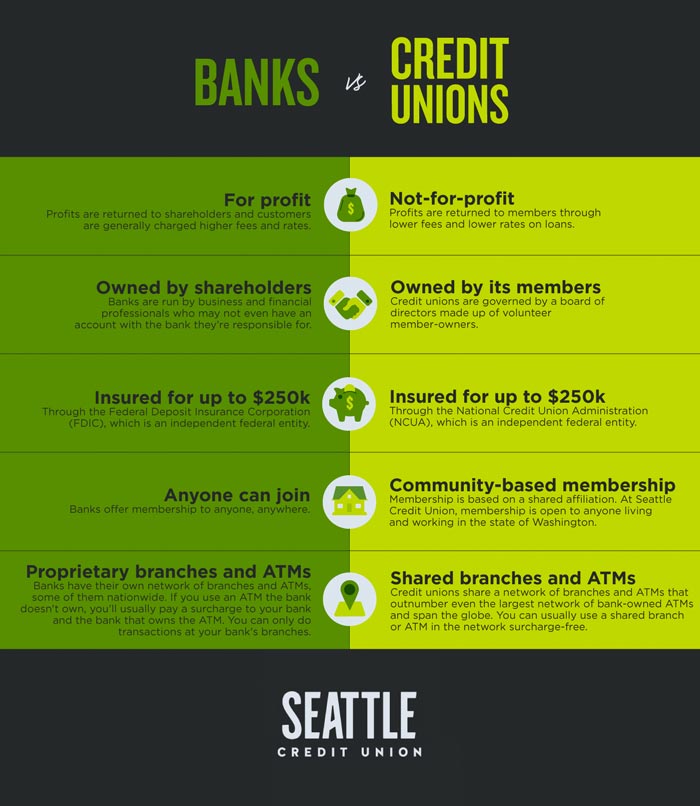Hybrid Line of Credit: Flexible Funding Options from Your Wyoming Credit Union
Hybrid Line of Credit: Flexible Funding Options from Your Wyoming Credit Union
Blog Article
The Ultimate Overview to Recognizing Credit Report Unions

Cooperative credit union stand as one-of-a-kind monetary entities, rooted in principles of shared support and member-driven procedures. Nevertheless, beyond their fundamental worths, understanding the intricate functions of lending institution entails a much deeper exploration. Unwinding the intricacies of membership qualification, the advancement of services used, and the unique advantages they bring needs a comprehensive assessment. As we navigate through the complexities of cooperative credit union, an informative trip waits for to lose light on these member-focused institutions and exactly how they vary from traditional banks.
What Are Lending Institution?
Cooperative credit union are member-owned financial institutions that provide a series of banking services to their participants. Unlike typical financial institutions, cooperative credit union operate as not-for-profit organizations, suggesting their main emphasis is on serving their participants instead than taking full advantage of earnings. Participants of a cooperative credit union usually share a typical bond, such as working for the same company, coming from the same community, or becoming part of the same company.
Among the crucial benefits of credit scores unions is that they often provide greater rates of interest on cost savings accounts and reduced rates of interest on fundings contrasted to banks. Federal Credit Union. This is due to the fact that lending institution are structured to benefit their members straight, enabling them to hand down their earnings in the form of much better rates and less fees. Additionally, credit scores unions are understood for their individualized consumer service, as they prioritize developing connections with their members to comprehend their distinct economic demands and objectives
Background and Advancement of Cooperative Credit Union
The roots of member-owned monetary cooperatives, understood today as lending institution, trace back to a time when areas looked for options to standard financial organizations. The idea of cooperative credit union come from the 19th century in Europe, with Friedrich Wilhelm Raiffeisen commonly attributed as the leader of the cooperative financial motion. Raiffeisen founded the first recognized lending institution in Germany in the mid-1800s, highlighting community assistance and self-help principles.
The evolution of cooperative credit union continued in The United States and Canada, where Alphonse Desjardins established the initial lending institution in Canada in 1900. Quickly after, in 1909, the very first U.S. cooperative credit union was developed in New Hampshire by a group of Franco-American immigrants. These early cooperative credit union operated the essential concepts of mutual aid, democratic control, and participant ownership.
Gradually, cooperative credit union have actually grown in popularity worldwide due to their not-for-profit framework, emphasis on serving participants, and offering competitive economic product or services. Today, cooperative credit union play a vital function in the monetary sector, offering community-oriented and obtainable financial alternatives for businesses and people alike.

Subscription and Eligibility Requirements
Subscription at a cooperative credit union is typically restricted to people meeting certain qualification criteria based upon the institution's starting concepts and regulatory demands. These criteria usually include aspects such as geographical location, employment standing, membership in particular companies, or association with details groups. Cooperative credit union are known for their community-oriented technique, which is mirrored in their subscription requirements. Credit Unions in Wyoming. Some credit scores unions might just offer individuals who live or function in a certain location, while others might be customized to workers of a particular firm or participants of a specific organization.
In addition, cooperative credit union are structured as not-for-profit companies, suggesting that their key goal is to offer their participants instead of create revenues for shareholders. This emphasis on member solution typically translates right into more personalized focus, lower costs, and competitive passion rates on financial savings and fundings accounts. By meeting the qualification standards and ending hop over to these guys up being a participant of a cooperative credit union, people can access a variety of financial product or services customized to their particular demands.
Services and Products Used
Among the vital elements that establishes credit score unions apart is the diverse series of economic product and services they supply to their members. Cooperative credit union normally give conventional banking services such as financial savings and inspecting accounts, fundings, and charge card. Participants can additionally gain from investment services, including retirement accounts and economic preparation assistance. Numerous lending institution supply affordable rates of interest on interest-bearing accounts and loans, as well as lower fees contrasted to traditional banks.
Moreover, cooperative credit union often give hassle-free online and mobile banking options for participants to quickly manage their funds. They might offer perks such as common branching, enabling members to access their accounts at various other cooperative credit union across the nation. Some cooperative credit union likewise give insurance coverage items like life, home, and vehicle insurance coverage to aid members protect their possessions and loved ones.

Advantages of Financial With Debt Unions
When taking into consideration economic establishments, discovering the advantages of banking with credit score unions discloses special advantages for participants seeking customized service and competitive prices. Unlike big financial institutions, click for info credit history unions are member-owned and prioritize structure solid partnerships with their participants. On the whole, financial with a debt union can give a much more personalized, economical, and member-centric economic experience.
Final Thought
In conclusion, cooperative credit union attract attention as member-owned banks that prioritize serving their participants over making best use of profits. With beginnings dating back to 19th century Europe, credit history unions comply with concepts of shared help and member possession. They supply a range of economic solutions and items, consisting of conventional banking services, investment alternatives, and competitive rate of interest. Subscription qualification criteria specify and mirror a community-oriented approach, giving tailored customer care and a member-centric monetary experience.
Credit rating unions are member-owned financial organizations that supply an array of financial services to their members. The concept of credit score unions stem in the 19th century in Europe, with read this Friedrich Wilhelm Raiffeisen usually attributed as the pioneer of the participating financial motion.The evolution of credit history unions continued in North America, where Alphonse Desjardins developed the very first credit history union in Canada in 1900. Credit rating unions normally offer standard banking services such as financial savings and inspecting accounts, fundings, and credit score cards.When thinking about financial establishments, checking out the benefits of banking with credit scores unions discloses special advantages for members looking for individualized service and competitive prices.
Report this page